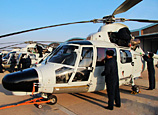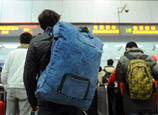
China has set up a new office to take charge of handling loans from the country's foreign reserves, the country's foreign exchange regulator announced Monday, in a move to improve the efficiency of using the reserves.
The State Administration of Foreign Exchange (SAFE) said in a statement Monday that the new SAFE Co-Financing unit will diversify the investment options for the country's foreign exchange reserves, in a bid to preserve and increase their value.
The central bank and SAFE have been exploring new ways to use the foreign exchange reserves to support financial institutions to serve the real economy and help with the "going global" strategy, the statement said.
"The move could help reduce the risks of devaluation of the country's large foreign reserve stockpile by cutting the holdings of reserves in dollars, given that the US fourth-round quantitative easing program (QE4) continues to pump more dollars into the market, and the value of the euro and Japanese yen continues to drop," Song Guoliang, a finance professor at the Beijing-based University of International Business and Economics, told the Global Times.
"By using foreign reserves as credit loans to firms, it could also support Chinese firms in investing abroad, which would offer higher returns than investing in US Treasury bonds. So the move could deliver dual benefits," Song said.
China's foreign exchange reserves hit $3.31 trillion by the end of 2012, the People's Bank of China said Thursday.
SAFE's statement did not reveal how much of the foreign reserves the new office would have access to, how the investment would be used, or how firms could apply for the loans.
The rate of return on the loans offered by SAFE will be determined through means similar to competitive bidding and the current level is around 2.5 percent, Caixin magazine reported Monday, citing unnamed sources.
China Development Bank was the first bank contracted with SAFE to provide loans using foreign reserves. The bank has around $250 billion of outstanding loans in foreign currencies, more than two-thirds of which are from the foreign reserves, the report said.
"China's foreign reserves are so huge but the efficiency of their use is too low. The key to improving efficiency is for SAFE to coordinate with commercial banks and use their experience in managing loans," Tan Yaling, head of the China Forex Investment Research Institute, told the Global Times.
















 The strongest left-behind children: 9-year-old girl holds up a family
The strongest left-behind children: 9-year-old girl holds up a family


![]()
